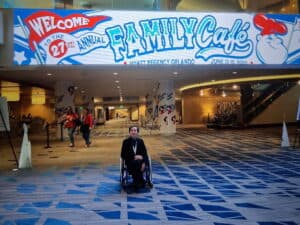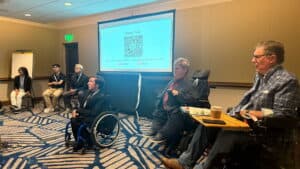School of Communication Sciences and Disorders (SCSD) doctoral student, Holden Allen, presented at two conferences in June 2025: the 27th Annual Family Café conference in Orlando, FL, and the Florida Council for Exceptional Children (FCEC) conference in Gainesville, FL.
Allen’s presentations ranged in topics from supporting disabled individuals in higher education contexts to enhancing collaboration success between speech-language pathologists and special educators. As someone with Central Core Disease, a rare form of muscular dystrophy, Allen greatly emphasized his passion for the disability community and bringing awareness to their experiences. “Since most disabled individuals only complete either a high school or a bachelor’s degree, I feel that, as a doctoral student, advocacy opportunities are important for showing caregivers and disabled individuals alike that success above the status quo is very much possible,” Allen said.
 At the Family Café conference, Allen represented Florida State University (FSU) as a Disability Advisor from the University of Choice Initiative at FSU, an organization that provides disabled students with resources and opportunities for success. Allen specifically highlighted that his advisory allowed him to demonstrate how FSU and the University of Choice Initiative are spearheading positive representation and support for disabled individuals in collegiate spaces.
At the Family Café conference, Allen represented Florida State University (FSU) as a Disability Advisor from the University of Choice Initiative at FSU, an organization that provides disabled students with resources and opportunities for success. Allen specifically highlighted that his advisory allowed him to demonstrate how FSU and the University of Choice Initiative are spearheading positive representation and support for disabled individuals in collegiate spaces.
Alongside his peers, Allen’s presentation, “Authentic Stories from College Students with Disabilities,” connected his firsthand experiences as a disabled individual in academia with support strategies for the disability community pursuing higher education.
Shortly after the Family Café conference, Allen led his presentation, “Enhancing outcomes for exceptional children: Cross-cutting strategies from special education and speech-language pathology,” at the FCEC conference. Allen hoped his audience would not only take away professional collaboration strategies but also grasp the significance of collaboration as a means of client success and professional skill development.
 Between these two conferences, Allen underlined the power of people acting as a collective in the disability community. “As a disabled individual, I believe that our personal drives and passions for our interests can often be unparalleled; however, handling all the added expectations of a life with a disability is much more manageable with the support of friends and family.” Allen also shared the same sentiment towards disabled individuals and the professionals assisting them: “Working in a team allows each member to use their unique backgrounds to support themselves and their fellow professionals to improve the success of the client.”
Between these two conferences, Allen underlined the power of people acting as a collective in the disability community. “As a disabled individual, I believe that our personal drives and passions for our interests can often be unparalleled; however, handling all the added expectations of a life with a disability is much more manageable with the support of friends and family.” Allen also shared the same sentiment towards disabled individuals and the professionals assisting them: “Working in a team allows each member to use their unique backgrounds to support themselves and their fellow professionals to improve the success of the client.”
Looking forward, Allen hopes to bring more awareness about the experiences of the disability community by continuing his research and promoting strategies that best prepare professionals to work with disabled clients. Allen also aims to explore how the speech-language pathology field can support the entry and retention of prospective disabled professionals who can use their personal experiences with disability as a resource for client treatment.

